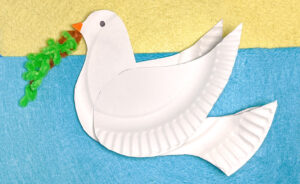As always, there are a number of special days to keep an eye out for this month. Find our tips and activity ideas below. Enjoy!
Purchase your copy of our 2022 Activity Wall Planner here
8th September: International Literacy Day
Create your own mobile library on a trolley or in a storage box. Use your existing selection of books and aim to source more from charity shops, donations and libraries. Include talking books, magazines and large-print books to ensure all residents can enjoy participating. Take your mobile library around the home, between bedrooms and communal areas. You may have a resident who would like to be the librarian.
- Hold a discussion session with your residents. Talk about the importance of literacy, and invite your residents to share their experiences and memories of reading. When did they learn to read? What books did they enjoy? Were they ever a member of a local library or book club?
- Make bookmarks. Encourage your residents to be as creative as possible and use a variety of materials. You could even print off famous quotes from fiction, or photocopy book covers and use these as material for collaging.
- Set up a Scrabble area. Some residents may enjoy playing a simple game of Scrabble with fellow residents, relatives or staff. Other residents may enjoy making artwork using Scrabble tiles.

15th September: Agatha Christie’s Birthday
Agatha Christie is the best-selling novelist of all time, with only the works of William Shakespeare and the Bible having sold more copies. She was born in Torquay, Devon, on this day in 1890.
In total, Christie wrote 66 novels and 14 short stories. Some of her most famous books include Murder on the Orient Express and Death on the Nile. She also wrote The Mousetrap, which is the longest performing play in history. Her most famous characters include Poirot and Miss Marple.
- Discuss Agatha Christie’s work. Gather some of her novels to use as reminiscence prompts. Encourage your residents to share memories of reading her books, or of certain characters they recall. Don’t worry if you go off theme – if you end up discussing other authors, that’s fine too!
- Watch an episode of Poirot or Miss Marple.
- Play a game of ‘Who Did It?’ inspired by Agatha Christie’s famous detectives. This game is a great way to get to know your residents and staff members. On a piece of paper, write down an interesting fact about each person (eg ‘I have lived in Australia’, or ‘I have had tea with the Queen’, or ‘I played cricket for Somerset’, etc). Read out the facts and ask your residents to guess who the fact belongs to. Once they have guessed correctly, invite the resident to share more information about their interesting fact. You should get some great stories this way.
- Another detective-inspired game, ‘What’s in the Bag?’, offers a more sensory-based opportunity for your residents to have a go at solving a mystery! Place an everyday item such as a toothbrush, comb, wooden clothes peg, etc, inside a cloth bag or pillowcase. Let your residents feel inside the bag and explore the object with their hands, then ask them to guess what it is. This game works well in a group setting (you can change the object once it’s been guessed correctly) but is also perfect as a one-to-one activity with residents who are in their bedrooms.
16th September: Anniversary of First WI Meeting, 1915
The first Women’s Institute meeting was held in 1915 with the original aim of being a force for good in the community. Over time, the WI has grown tremendously. Today it is the largest women’s organisation in the country. A WI membership offers the opportunity to meet women in your local area, both in person and virtually, to make friends and to make a difference to your community.
- Reach out to your local WI group. Invite a representative to visit your home to hold a talk.
- Print off lyrics to the hymn Jerusalem and hold a singalong session.
- Decorate jam jars with paint or stickers. Stash these away to use as containers to give gifts in at Christmastime.
- Arrange a quiz about famous women through the ages.
21st September: World Alzheimer’s Day
The aim for today should be to get people talking about dementia and to have a better understanding of what living with dementia means. You could use the day to encourage families to talk and to break down the stigma surrounding dementia in your local community.
- Organise a cheese and wine evening for families, friends and the wider community. Invite a member of the Alzheimer’s Society in to do a simple presentation.
- Encourage relatives, volunteers, visitors and individuals within your wider care home community to become dementia friends.
- Use this week to enhance your knowledge of residents. Start a scrapbook for individuals with pictures of where they grew up, their favourite pets, family members, favourite flowers and so on. Encourage all staff to be involved, to look at their life history books and to add to them when they discover something new about the individual.
- Plant forget-me-not seeds with your residents.
- Paint simple forget-me-not flowers using thumb prints of blue paint for petals and a finger tip of yellow paint for the centre. Draw in a stem and leaf with green paint or paper. Display these pictures in your communal area or in the bedrooms of residents who are bedbound.
21st September: International Day of Peace
This day is perfect for celebrating our differences. Maybe you have residents who are from a different culture to the majority of your group. Use the day to explore their beliefs and backgrounds.
- Aim to link up with other care homes, either in this country or abroad, via Skype or a pen-pal scheme.
- Invite church leaders in to your care home to offer a prayer or discussion session.
- Make friendship cards and send them to relatives, volunteers, or people within your community.
- Have a discussion session about peace – explore what peace means to each individual, and discuss ideas for making your care setting more peaceful.
- Make white tissue-paper flowers and/or white butterflies to display in your windows.

25-27th September: Rosh Hashanah
Rosh Hashanah is a Jewish festival celebrating the creation of Adam and Eve. It is often referred to as the Jewish New Year. Traditionally, Jewish people celebrate by lighting candles, praying and preparing festive meals. The start of festivities is heralded by the blowing of a ram’s horn called a shofar.
- Consult your life story books to see if you have any residents with links to the Jewish community. As with all religious festivals, it is worth chatting to your local religious groups. In this case, reach out to your local rabbi to request their involvement and support in celebrating this event with your residents.
- Try making challah bread, a traditional, plaited Jewish loaf. Serve slices of bread dipped in honey.

29th September: Michaelmas
Harvest is a very important part of the farming calendar. It is the time of year that can make or break a business, and it is very weather dependent. Many people from rural backgrounds will remember the harvest festival, where donations of food from their farms and gardens were placed upon the altar to say thank you to God for a good harvest. Nowadays tins and packets of food are often donated and usually given to a local shelter for the homeless or a food bank.
Michaelmas Day on 29th September is traditionally known as the last day of harvest. It is also known as Goose Day – the day when goose fairs were held. Horses carrying the last load of the harvest would be decorated with flowers and ribbons. Mop fairs, when labourers offered themselves for hire, took place the next day. The first day of harvest used to be known as Lammas and was held on 1st August. This is when bread was made with the new wheat for the church. The bread was used for a special communion service to thank God for the harvest.
It is worth remembering that harvests are happening all around the world and everything we eat and drink will have come from a farm. It is very appropriate that we take the time to celebrate the work of farmers wherever they may be.
- Involve your residents in creating a display of fruit and vegetables – raid the home’s kitchen! If you are rural, ask a local farmer if you can pick a vase full of wheat or barley to go with your display.
- Talk about the traditional farming methods, such as sheaves, threshing and stooking, as well as using horses to do the work. Many will remember the whole village helping during the harvest.
- Hold a leaf-rubbing session using paper, crayons and pencils.
- Have a word with your local vicar. They may well come in and run a short service for you. Put up a poster, invite family and friends, and provide tea and cake afterwards to make it a really special occasion.

30th September: World’s Biggest Coffee Morning
This is a large, national fundraising event held to support people living with cancer. People all over the UK host their own coffee morning and donate the proceeds to Macmillan. The official date of the coffee morning is Friday 30th September, but you can hold an event at any time.
Sign up here to request your free fundraising pack.
Involve your residents in planning the event. Invite them to make posters, bake and/or decorate cakes, and decide other ways to raise money. They may wish to paint pebbles to sell at your coffee morning or make pressed-flower bookmarks.
As well as serving tea, coffee and cakes, you could run a raffle or tombola.
We hope you find these suggestions useful. We always love to see and hear what our readers have been up to – please email photos and stories to for your chance to be featured in our Reader’s Corner!




